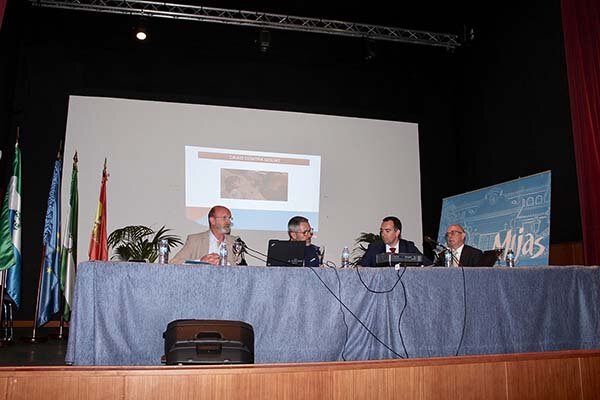Remember; SOHA.ES 2019 AGM January 23rd, 19.30 hrs at the Camping restaurant
More links from Spanish media at the bottom of this page
The possession of the municipality of Cala de Mijas hosted on October 26 an informative day on “the reality of undeveloped land” and the problem of housing built on this type of territory, which affects nearly 400,000 families.

The sessions were moderated by the councilor of Urbanism and Deputy Mayor of the municipality of Mijas, Andrés Ruíz León, who indicated that for once it would be convenient for the administrations to admit their errors in terms of urban legislation. “We are at the right historical moment to establish solutions and not patches.”
After the presentation and opening of the conference by Juan Carlos Maldonado, Mayor of Mijas, who explained that the objective is to provide ideas and establish a dialogue between those affected and administrations and that affects local economies, as buyers of Homes want guarantees and trust administrations.
Mario Blancke, spokesman for SOHA.ES and mayor of Alcaucín, made a presentation entitled “David against Goliath”, in which he explained that their struggle “is a matter of justice” and called for the need to trust the institutions.
“When these injustices occur, it is when the distrust in the administrations can begin,” Blancke added. “That’s why we want to work together with the administration to solve this problem for buyers in good faith.”
“However, we have been disappointed with the response from the administrations, which affects 300,000 homes in Andalusia, a real social drama,” concluded the mayor of Alcaucín.
For his part, Phil Smalley, president of SOHA.ES contributed his personal experience as a purchaser in good faith affected by a declaration of nullity of a work license granted by the municipality of Alcaucín. A situation of defenselessness to which still today is being submitted by the administrations. “We do not ask for an amnesty, as some propose, because that would be admitting that we have committed a crime.”
The interventions of Professor Jesús Jordano, professor of administrative law at the University of Seville, continued; of D. Venancio Gutiérrez Colomina, general secretary of the City of Málaga and associate professor of administrative law at the University of Málaga; and of Mr. Jorge Díaz Cadórniga, notary spokesperson of the Notarial Association of Andalusia on urban issues, who spoke about the real estate, cadastral and urban regularization of irregular housing.
The interventions of the three speakers gave a glimpse of the legal labyrinth that currently exists in urban planning legislation and that the successive modifications are actually patches, through interpretations.
They demanded a new decentralized urban law, because not all municipalities are equal, and the need to know the reality of the territories before legislating, to, on the one hand, avoid speculation and, on the other, the depopulation of rural areas, but that maintains the environmental conditions.
Diario Sur link here.
Mijas Communicacion link here.
SOHA.ES participa en las jornadas sobre suelo no urbanizable en Mijas
La tenencia de alcaldía de la Cala de Mijas acogió el pasado 26 de octubre una jornada informativa sobre “la realidad del suelo no urbanizable” y el problema de las viviendas construidas sobre este tipo de territorio, que afecta a casi 400.000 familias.
Las jornadas estuvieron moderadas por el concejal de Urbanismo y teniente de alcalde del ayuntamiento de Mijas, Andrés Ruíz León, que indicó que por una vez sería conveniente que las administraciones admitieran sus errores en materia de legislación urbanística. “Estamos en el momento histórico adecuado para establecer soluciones y no parches”.
Tras la presentación e inauguración de las jornadas por parte de Juan Carlos Maldonado, alcalde de Mijas, que explicó que el objetivo es aportar ideas y establecer un dialogo entre los afectados y las administraciones y que afecta a las economías locales, ya que los compradores de viviendas quieren garantías y confiar en las administraciones.
Mario Blancke, portavoz de SOHA.ES y alcalde de Alcaucín, hizo una presentación titulada “David contra Goliat”, en la que explicó que su lucha “es una cuestión de justicia” y reclamó la necesidad de confiar en las instituciones.
“Cuando se dan estas injusticias, es cuando puede comenzar la desconfianza en las administraciones”, añadió Blancke. “Por eso queremos trabajar junto con la administración para resolver este problema para los compradores de buena fe”.
“Sin embargo, nos hemos sentido defraudados con la respuesta por parte de las administraciones, que afecta a 300.000 viviendas en Andalucía, un verdadero drama social”, concluyó el alcalde de Alcaucín.
Por su parte, Phil Smalley, presidente de SOHA.ES aportó su experiencia personal como comprador de buena fe afectado por una declaración de nulidad de una licencia de obra concedida por el ayuntamiento de Alcaucín. Una situación de indefensión a la que todavía hoy está siendo sometido por las administraciones. “Nosotros no pedimos una amnistía, como algunos proponen, porque eso sería admitir que hemos cometido un delito”.
Continuaron las intervenciones del profesor Jesús Jordano, catedrático de derecho administrativo de la Universidad de Sevilla; de D. Venancio Gutiérrez Colomina, secretario general del Ayuntamiento de Málaga y profesor asociado de derecho administrativo de la Universidad de Málaga; y de D. Jorge Díaz Cadórniga, notario portavoz del Colegio Notarial de Andalucía sobre asuntos urbanísticos, que habló de la regularización inmobiliaria, catastral y urbanística de viviendas irregulares.
Las intervenciones de los tres ponentes dejaron entrever el laberinto legal que existe actualmente en la legislación urbanística y que las sucesivas modificaciones son en realidad parches, a través de interpretaciones.
Reclamaron una nueva ley urbanística descentralizada, porque no todos los municipios son iguales, y la necesidad de conocer la realidad de los territorios antes de legislar, para, por un lado, evitar la especulación y, por otro, la despoblación de las zonas rurales, pero que mantenga los condicionantes medio ambientales.






